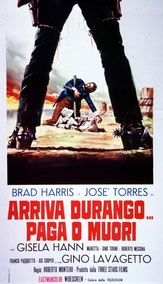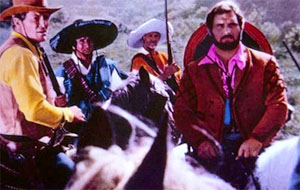
1971
Original running length: 88 mins
Italy
A Three Stars Films (Rome) production
Distribution: Independent regional
Director: Roberto Bianchi Montero
Story & screenplay: Mario Guerra, Vittoriano Vighi
Cinematography: Mario Mancini
Music: Coriolano Gori
Editor: Adriano Tagliavia
Cast: Brad Harris (Durango), José Torres (Guercho, aka El Tuerto), Gisela Hahn (Margot), Gino Lavagetto (Ferguson), Maretta [Procaccini] (Jane), Andrea Scotti (Arellana), Asttilio Dottesio (Peter), Gino Turini, Roberto Messina (Mr Morris, Ferguson’s henchman), Franco Pasquetto, Gis Cooper [Gisleno Procaccini], Emilio Zago, Claudio Trionfi, Iro Fantini, Giovanni Cianfriglia (El Tuerto’s man)
Uncredited: Fortunato Arena (a poker player), Emilio Messina (Pejana), Salvatore Puntillo (Manuel Bienvenido), Armando Bottin (Ferguson’s henchman), Franco Beltramme (Pejana’s man)
Durango is Coming, Pay or Die is an obscure Italian western from the early seventies, directed by the veteran filmmaker Roberto Bianchi Montero. Montero was a solid craftsman who made competent if unspectacular films in just about every popular genre going, and this is no different: the low budget is painfully evident at times and the plot is rubbish, but it’s reasonably enjoyable and better made than many of its ilk.
Durango (Brad Harris) is an infamous gunman who makes his living as a debt collector, always charging ten percent of the debt’s value as his fee. Newly arrived in Tucson City, he soon finds himself up to his neck in other people’s trouble. He turns down an offer from the local bank manager and general bigwig, Ferguson (Gino Lavagetto), to work as one of his hired thugs – Durango only works for himself, natch – before tracking down and capturing a cowardly bandito, El Tuerto (José Torres), who has carried out a stagecoach robbery and made off with a substantial amount of the bank’s cash.

Ferguson, though, balks at the prospect of paying out Durango’s normal ten percent recovery fee, and has him framed for theft and murder in order to avoid paying up. Locked up in jail and faced with the prospect of the noose, he has no choice but to join forces with El Tuerto, who is conveniently imprisoned in the cell next to him, and arrange a jail break. Out for revenge, not to mention the money he’s still owed, he puts together a plan to steal all of Ferguson’s shadily acquired loot…
Allegedly produced by Gisleno Procaccini, who also has a small acting part in the film, this was one of a handful of productions financed by the Three Stars Films company formed by Walter Brandi, Ralph Zucker and, apparently, Gabriele Crisanti, all of whom were very active in the world of low budget Italian cinema at the time. According to Crisanti, it was one of three Sartana style westerns planned to star Brad Harris and, indeed, they also financed Roberto Mauri’s Wanted Sabata (70), which could well have been another in the intended series. Mauri, who had a long association with Brandi and Zucker, also made Sartana in the Valley of Death (70), which appears to be an entirely separate enterprise, and several ‘Holy Ghost’ films in 1971 and 72, some of which reused footage from Wanted Sabata and, quite possibly, Durango is Coming. Suffice to say, the precise chronology and inter-relationship between all of these films is murky at best, but they all share a limited budget and have the typically verdant look of the Italian-shot westerns of the time.

Durango is Coming exhibits many of the failings of post-1960s Italian westerns. The production values are variable, there’s too much emphasis on cramming in as many fist-fights as possible and too little attention paid to plot development. However, in its favour it does try to give its characters some substance – even acknowledging the political spaghettis of Damiani and Corbucci by giving El Tuerto a background story as a former revolutionary – and it steers clear of the slapstick humour that was corroding the genre at the time (even though it was written by comedy specialists Mario Guerra and Vittorio Vighi). Considering the constraints, Montero also handles the directorial chores decently enough; he also made two other good, serious westerns, Two Faces of the Dollar (67) and Sentence of God (72).
Despite being a stalwart performer in other genres, Brad Harris never seemed a natural in the Spaghetti Westerns: he just seems a little too earnest, too healthy. He’s not bad here, but not as effective as he was in his spy and action films. The best performances, as is so often the case, come from the villains. José Torres, a busy character actor, is great fun as El Tuerto, a kind of second rate version of the characters played by Tomas Milian in The Big Gundown and Companeros. Gino Lavagetto, who’s a dead ringer for John Landis, was a theatre actor who appeared in both this and Wanted Sabata, and he makes for a suitably hysterical bad guy.

